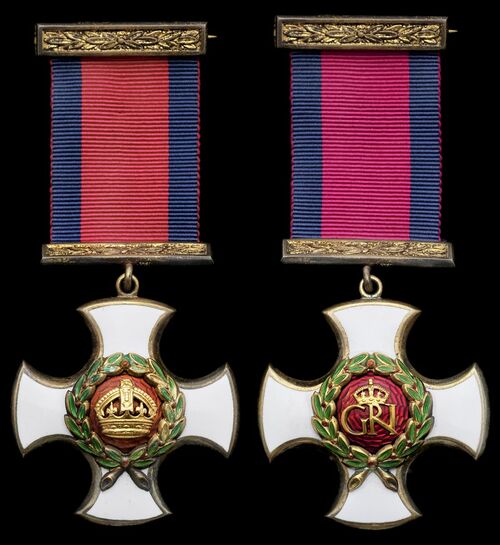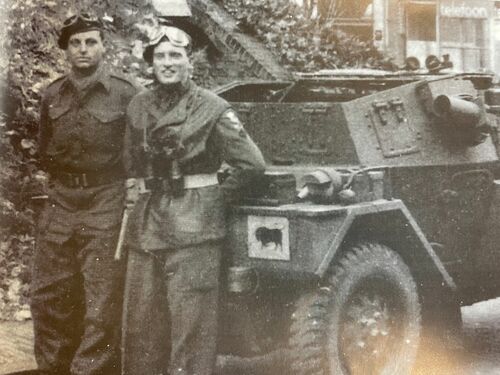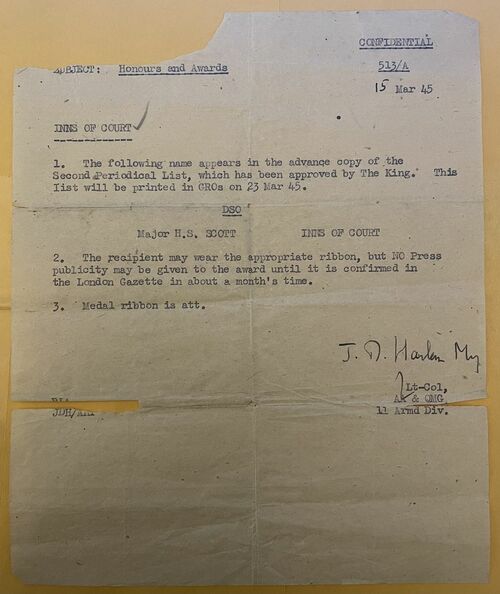Auction: 23001 - Orders, Decorations and Medals
Lot: 384
(x) 'Hilary commanded "A" Squadron of the Inns of Court Regiment when I joined him as a troop leader in December 1942 straight from Sandhurst. I served with him until he was invalided home from Holland.
Throughout the campaign he inspired the greatest confidence in his officers and men. He was never far away from his troops when we were on reconnaissance and never gave up trying to sustain, regain or establish radio contact with us. By his skillful and painstaking application to his responsibilities, Hilary time and again saved our lives. He never gave up on any of us, however hopeless the predicament seemed to be. Somehow his familiar and reassuring voice got through to us and penetrated the most difficult radio conditions.
After the War, when I and Hugh Simm - another Troop Leader - came to work in London, we gladly accepted his offer of rooms in his Lansdowne Road house. It was a happy time...if it were not for Hilary, I and many others would not be here to tell the tale.'
Major Howard Ashby on the death of his comrade
The North-West Europe D.S.O. awarded to Major H. S. Scott, Inns of Court Regiment, who was decorated for his gallant service following the D-Day landings
Distinguished Service Order, G.VI.R., the reverse officially dated '1945' and in its Garrard & Co., London case of issue, a little green enamel chipping, good very fine
Two D.S.O.'s awarded to the Inns of Court Armoured Car Regiment during the Second World War. The other award was sold in these rooms in 2015 and was acquired by the Regimental Museum.
D.S.O. London Gazette 29 March 1945. The original recommendation states:
'This Officer has commanded his Squadron in this theatre of war from the day it landed in the Bridgehead until the present time, and during the whole of this period the Regiment has been in action with the only break for four days. Major Scott has at all times shown the greatest skill, courage and devotion to duty. During the whole of the Division's advance from VASSY to Antwerp and in the subsequent operations in EASTERN BELGIUM and HOLLAND he has constantly been up with his leading Troops encouraging them and pressing the advance with completed disregard for his own personal safety.
Wherever the situation has been most dangerous Major Scott was always to be found, and his coolness under enemy fire and aggressive spirit have set a magnificent example to his Squadron and maintained their morale at an exceptionally high level. Moreover his determination and outstanding powers of leadership, combined with a fine tactical sense, have resulted in the consistent production of invaluable information about the enemy, and have thus on many occasions been responsible for the maintenance of the Division's advance at the greatest possible speed.'
Hilary Somerville Scott was born in India on 22 October 1914 and with the outbreak of the Second World War went up to Sandhurst, when he was in the Royal Armoured Corps Wing. Commissioned 2nd Lieutenant in the Royal Tank Regiment on 9 November 1940, he saw action in North-West Europe with the Inns of Court Regiment - 'The Devil's Own' - who served as an armoured car reconnaissance unit of I Corps. 'C' Squadron landed on Juno Beach on D-Day and they shared in the fierce fighting in that campaign. Having been put in for his richly-deserved D.S.O. on 31 October 1944, Scott remained with the unit and was made Major in June 1949. He ceased to be upon the Reserve of Officers in October 1964 and died in Dorset on 26 June 2000. He was survived by his third wife and a son by his first marriage.
Sold together with letter, this 'Confidential', dated 15 March 1945, confirming the award of the D.S.O. having been approved.
Extracts from his diary and an obituary were published in the Inns of Court Regimental Journal Vanguard, over several editions, with copies provided. One extract gives good detail:
'The 4 weeks from mid-July to mid-August were one of the worst times of the campaign for us. There was heavy rain, and the "Bocage" country was the worst possible operating country for an armoured-car regiment. The German defences had strengthened considerably.
On July 22nd one of our trucks blew up in the support vehicles harbour area, for no accountable reason, and 5 troopers were killed.
Eleven days later, on 2nd August, the Regiment had one of it's worst days. We were working with the Guards Armoured Division and first of all lost two troop-leaders, a troop sergeant and a number of troopers, all in the area of Le Tourneur, while trying to find a river crossing. Finally, when no crossing had been found, and the division was completely held up on a narrow front, came the worst news of all. I heard first that Wyndham had been badly wounded near Le Tourneur, and, as we were a few miles away and were ourselves operating on the division 's left flank, had no means of checking up on this report. It was not until 5 days later that I heard that Wyndham was dead. He was an extraordinarily brave man and on this occasion, was sitting on top of his scout-car among his forward troops, who were also held up with the Guards Armoured Division.
They were on a road which was being heavily mortared and Wyndham was obviously setting an example of great coolness under fire, to help his troops' morale. He was not wearing his stud helmet, and apparently a mortar bomb landed on the engine cover at the back of his scout car, killing him instantly. It was terrible blow for the Regiment, but also particularly, for the Squadron, who really loved him. For me, of course, he was a brother-in-law, who was more like a brother, as I had spent so much of the previous 15 years with him, at Winchester, in the City, and in the army. I had the dreadful task of letting Ursula and my family know, and I wrote to Water Hall that day, 7th August.
Fortunately we had then had a few days of comparative quiet to absorb the shocks of the past few days. On 15th August the Regiment came officially under command of 11th Armoured Division.
At this point I reported to Brigadier Roscoe Harvey, commanding 29th Armoured Brigade, for orders. I reminded him of my failure to join the 10th Hussars in November 1940, when he was commanding the Regiment in Egypt. After expressing his disappointment in a few well-chosen words we agreed to call it quits and get on with the war. 'A' Squadron was able later to help 29th Armoured in their subsequent advance to Belgium and Holland, so that all was forgiven.
From the middle of August things really began to move. Eight German armoured divisions and 10 Infantry divisions were trapped in the Mortain-Falaise "gap" or "pocket" which was formed by a link - up between the British, Canadian and American armies. 'A' Squadron was working with 3rd U.S. Armoured Division, and Howard Ashby and his troop were the first British Troops to meet the Americans and close the gap. The destruction of the german army which was caught in the "pocket" meant the end of effective german resistance in France.
During the latter part of August a group of about 200 of the Maquis attached themselves to "A" Squadron - and my french came in very useful in dealing with them. They, naturally, had one main objective, which was to kill as many Germans as possible. They showed great bravery in finding and attacking small german infantry positions, but unfortunately, with virtually no tactical training, they suffered many quite unnecessary casualties. I was most impressed by their enthusiasm and tried to help as much as possible through their "Commandant". However I could find no continuity of command as they had a different "Commandant" almost every day. Another of their main activities was rounding-up a few people, male and female, who had collaborated with the Germans during their occupation. Women had their heads shaved, and men were beaten-up one or two were shot, which greatly upset one of my sergeants, a qualified english solicitor, who objected strongly, and probably quite correctly, to executions without a fair trial. However we were heavily involved ourselves, and I did not feel like interfering in local affairs, remembering the four years and work of misery and oppression to which they had been subjected by Hitler's "master race".
On 26th August we started our real move eastward and northward towards Belgium, and on the afternoon of 28th we crossed the Seine at Vernon. 11th Armoured Division also crossed on 28th and 29th, and we were operating in front of 29th Armoured Brigade and 8th Armoured Brigade. This was the start of a very rapid advance to Antwerp, via Amiens, Arras, Lens, Dovai, the area of Brussels and up to Antwerp. All I remember was no sleep for several interminable nights on the road, and the overwhelming exhaustion when we finally reached Antwerp on 5th September. To help us keep awake we had been issued with supplies of Benzidrene tablets - which were very effective for a few hours, but produced a real "let-down" after that.
There were still some Germans offering sporadic resistance in the outskirts of Antwerp, so we did not spend much time Oere. However, before withdrawing, I decided to check out a fort (Fort Huit) which I knew had been occupied by the Germans. I remember walking down a long, wide, dark passageway into the middle of the fort, clearly silhouetted against the day-light and making a great target for anyone with a machine-gun. Fortunately all the Germans had left - so we withdrew for the night to the little town of Contich.'
Subject to 5% tax on Hammer Price in addition to 20% VAT on Buyer’s Premium.
Sold for
£1,900
Starting price
£1300









